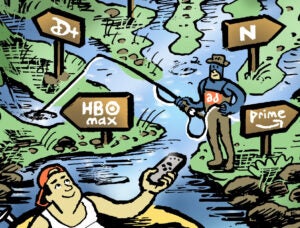“Data-Driven Thinking” is written by members of the media community and contains fresh ideas on the digital revolution in media.
Today’s column is written by Matt Greitzer, co-founder at Actable Data.
The onslaught of technology companies disrupting the marketing services landscape continues unabated.
Despite consolidation – and some capitulation – in advertising technology, the adjacent marketing technology ecosystem is as cluttered and confusing as ever, commanding an outsize share of marketers’ attention.
For agencies and marketing services companies, this creates opportunity since skilled implementers, practitioners and operators are in high demand. Yet agency response to this opportunity has been uneven.
In fact, a subtle but profound difference in how agencies approach technology has created different outcomes that will define the future “haves” and “have-nots” in a tech-driven marketing landscape.
This subtle difference hinges on a simple point of view: Are you tech agnostic or tech objective?
Technology agnostic
The term “tech agnostic” rose to prominence in the agency community a decade ago as technology companies transformed the media buying landscape with SaaS-based platforms.
The services companies that stewarded media dollars and buying expertise – namely media buying agencies – were overwhelmed by the array of choices, options and confusing, seemingly similar sales pitches proffered by these new tech interlopers.
Unsure of how this new landscape would shake out and, perhaps, intimidated by the jargon and bluster of VC-backed technology companies, many media agencies assumed a stance of tech agnosticism. They declined to pick winners and losers and limited their contributions to cross-platform feature comparisons and operational competence.
Whether they intended to be truly agnostic – unwilling to commit to an opinion about something – or merely impartial is a fair point of debate. But word choices do matter, and when media agencies declared – on panels, pitches and in the press – their agnostic stance, they ceded a valuable and necessary position as arbiters of quality and merit in a confusing, crowded tech landscape, creating a vacuum for objective, informed advice.
Marketers with a pressing need for clarity filled the vacuum by turning to consultants and industry analysts, experts who advise strategically, but don’t execute. Tech agnostic media agencies were now divorced from the strategic decision-making about technology and relegated to “hands-on-keyboard” execution partners. There is value in that model, but it’s easily commoditized. Eventually marketers began to think they could recreate that value – with more control and lower costs – in house.
Technology objective
Another class of marketing services companies tacked a different course. Not tech agnostic at all, these agencies adopted a “tech objective” stance: They worked to develop deep category expertise in the emerging technology landscape and developed an informed point of view on which tech partners to align with and why. They had opinions, formed objectively, and were not afraid to pick winners and losers.
Companies such as Accenture, Sapient, Merkle and my former Accordant Media saw the opportunity to create new business models in this environment, creating service layers, data layers and entire practice areas on top of these tech platforms. They established partnerships with key technology providers in a mutually beneficial arrangement coupling software and services.
To be clear, this was done not out of largess or goodwill. These agencies built new revenue streams via objective selection, implementation and management of technology partners.
And while doing so they also strengthened their role as strategic guides in a new environment and lifted their value proposition beyond “hands on keyboard” staff augmentation.
A decade ago, you could argue the merits of each approach. Today, not so much.
Tech-agnostic companies have suffered low growth, commoditized pricing and a diminished value proposition – most of those without global scale have disappeared altogether. Tech-objective companies have thrived and are now poised to dominate a market in which they barely participated 10 years ago.
And that market is still expanding – the demand for informed advice on technology implementation and operation has never been greater, the skills gap between marketing technology and their end-customers has never been wider, and the imperative for marketing services organizations to weigh in with objective, opinioned advice has never been more clear.
Follow Matt Greitzer (@mattgreitzer) and AdExchanger (@adexchanger) on Twitter.












